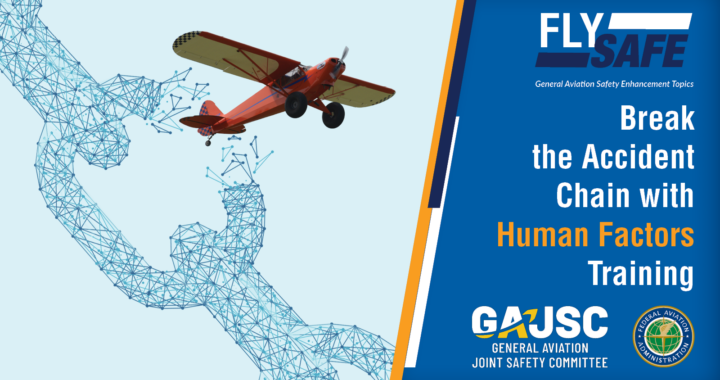A GAJSC study of fatal general aviation loss-of-control accidents found that a significant number of them were attributable to human performance deficiencies and that basic human factors education would benefit all pilots. In this article, we’ll look at some human performance issues that can impact our piloting abilities, namely fatigue, stress, and maintaining a healthy lifestyle.
Maintaining balance in these three areas is a constant issue for many pilots. Managing fatigue, stress, and health can range from simple daily challenges to overwhelming problems that can affect your performance. Let’s take a closer look at these three areas and examine some ways to better understand and manage them.
Fatigue
We must be well rested to perform at our best. For most adults, that means 7 to 9 hours of uninterrupted sleep each night.
Professional pilots often cite work schedules and commuting requirements as reasons why they are fatigued. Private pilots must also fit their flying into daily work and family schedules. That means they are often tempted to rise early or fly after work. Either way, they may not be adequately rested before taking flight.
Without adequate rest, we can expect to exhibit symptoms such as judgment errors, forgetfulness, sleepiness, loss of appetite, irritability, and imprecise flying. These symptoms may be subtle or more profound. Either way, if you feel that you’re not performing at your best, you’re probably right, and that degradation of performance may very well be due to fatigue.
Let’s consider a scenario where you’re planning a 3-hour after-work flight to take your family for a vacation on the lake. You got 7 hours of rest the night before but worked a 12-hour day, including your commute time. Do you think you’ll be adequately rested before the flight? Probably not. You might be used to long workdays, but you’ll have been going for more than 15 hours by the time you land. And were you able to grab dinner before that flight? Being tired, hungry, and dehydrated is no way to begin or end a flight.
Here are some fatigue tips to keep in mind before your next flight:
- Consider flying activities to be part of your total workday so you don’t overdo it
- Plan a maximum of 12 to 14 hours per work period and schedule a 12-hour break between work periods
- Schedule a maximum of 6 consecutive work periods followed by a 24 to 48-hour rest period
Stress
Stress is a physiological and cognitive response to stressors — circumstances, events, and attitudes that shape our lives. Stress can build up over time, or it can be an acute reaction to the pressures of the moment. When determining our fitness to fly, we need to consider our mental well-being as well as our physical state.
No one leads a stress-free life, and indeed, moderate stress is healthy and enables us to do our best. But stress overload is another thing altogether. Our performance and health both suffer if we're overstressed. The trick is to maintain an optimum stress level — especially when engaged in complex and demanding activities like flying.
Stress can be triggered by immediate, challenging, or threatening situations, long-term background issues, or both. Your response to stress depends on both stress intensity and length of exposure.
Chronic (long-term) stress can become so routine that you are no longer aware of it — but it still causes harm. Some chronic stress symptoms include anger, depression, fatigue, aches and pains, and feeling overwhelmed.
Another type of stress is acute stress. This sudden and extreme stress — like when you are startled — may activate a deep-seated, reflexive fight or flight reaction that can lead us into a vortex of inappropriate action or no action at all. At the bottom of the vortex, we are spending all of our mental energy on staying alive with no capacity to reason our way out of our predicament.
The best way to cope with flying stressors is to prepare during pre-flight and take timely corrective action in-flight.
- Prepare — Know how to deal with normal and abnormal flight situations and practice managing them effectively.
- Anticipate — Identify hazards and threats that could arise during flight, even if they are unlikely. This will reduce the chance of an inappropriate startle response.
- Plan — Once you've identified hazards and threats, plan how you will deal with them should they arise. Participating in a regular program of proficiency flying, such as the FAA WINGS Pilot Proficiency Program, will keep you flying at the top of your game.
- Brief — Brief your plan to other crew members and/or passengers. Tell them what you will do if the flight does not go according to plan. Be sure to brief alternate destinations. This will preclude discussions or complaints while you are busy navigating to an alternate.
- Manage flight resources— Make use of in-flight resources that reduce pilot workload. Autopilot use or sharing flying duties with another pilot can give you additional time to attend to navigation and communication tasks. That said, don't become over-reliant on automated systems. Practice to proficiency so that you will always be comfortable with assuming control.
- Take timely action —If things are not going according to plan, take action to correct them immediately. It's always best to address small problems early, before they become big ones.
Health and Well-being
Diet, health, and well-being are all important elements of optimum human performance. Like many things in life, it’s all a matter of balance.
We've all had days when there just isn't enough time to accomplish everything we intend to do. In situations like these, most of us will cut some things short to have more time for others. Unfortunately, this practice often results in shorter rest periods and skipped or rushed meals. When pressed for time, you might be more likely to skip a meal or else grab some coffee and a donut. Neither is a good choice. It’s best to try to make time for a balanced breakfast that provides nourishment for more than an hour.
When it comes to healthy eating, you should strive for balance, variety, and moderation.
Balance — Balance your weight by matching food intake to physical activity. Everyone needs different amounts of energy. Eat mostly fresh whole foods and plenty of vegetables. Avoid processed and convenience foods. Most have too much added sugar and salt.
Variety — Try to eat from all the food groups each day. If possible, vary the food in each group daily. It will keep meals interesting and provide a broad range of nutritional benefits. And avoid fried foods. They may contain harmful trans-fats from cooking oil.
Moderation — Practice portion control. It’s easy to overdo restaurant and takeout fare, so enjoy food and drink in moderation. Limit treats and alcohol; they tend to be high in calories and low in nutrients. Be careful while traveling. Fast foods readily available on the road are less healthy, and hotel buffets can encourage overeating.
Also, be sure to plan for hydration needs before, during, and after flight. Don’t wait until you’re thirsty, which is already one sign of dehydration. Skip the mochas, lattes, and sodas and instead choose plain water as your hydration source.
Another vital part of maintaining a healthy lifestyle involves exercise and physical activity. The benefits of exercise are well-documented. Among other things, regular exercise can improve memory and brain function, help you manage weight, and provide protection against many chronic diseases. Strive to spend 30 minutes a day doing some form of exercise or physical activity like biking, weight-lifting, or just taking a long walk.
Exploring the Connections
We’ve talked about a few human performance influencers here in isolation, but it’s important to realize that they’re also interconnected in several interesting ways. Diet, sleep, physical and mental health, stress, and exercise are linked and all influence our well-being in different ways. Each can influence the other in positive or negative ways. For example, stress can lead to a poor diet and poor sleep, while a poor diet and poor sleep can increase stress.
Understanding these individual factors and how they interrelate is key to maintaining optimal performance both in and outside the flight deck.
Want to Learn More?
 Nine new Human Factors courses based on the Australian Civil Aviation Safety Authority’s Safety Behaviors — Human Factors for Pilots are available on FAASafety.gov. The course modules focus on safety culture, human performance, communication, teamwork, situational awareness, decision-making, threat and error management, human information processing, and design and automation. The courses are eligible for credit in the WINGS Pilot Proficiency Program.
Nine new Human Factors courses based on the Australian Civil Aviation Safety Authority’s Safety Behaviors — Human Factors for Pilots are available on FAASafety.gov. The course modules focus on safety culture, human performance, communication, teamwork, situational awareness, decision-making, threat and error management, human information processing, and design and automation. The courses are eligible for credit in the WINGS Pilot Proficiency Program.

